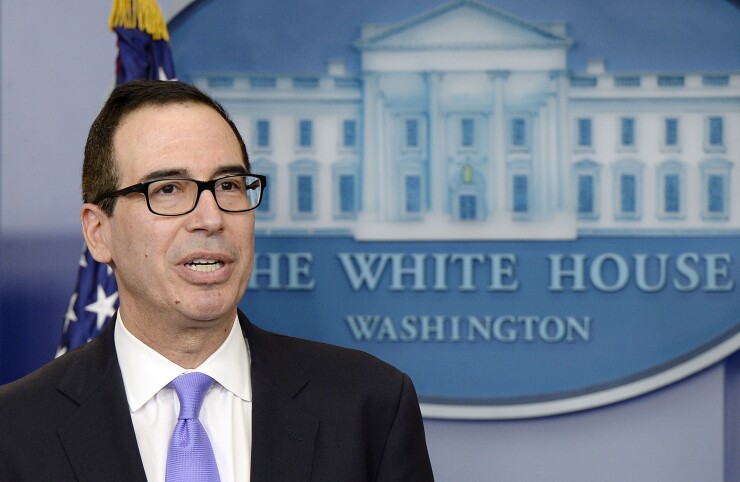DALLAS – The administration’s tax reform package will not include any federal funding for President Trump’s $1 trillion, 10-year infrastructure proposal, Treasury Secretary Steven Mnuchin said Wednesday ahead of the formal unveiling of the plan.
“This plan is just tax reform,” Mnuchin said at an event sponsored by The Hill newspaper. “This is going to be the biggest tax cut and largest tax reform in history of our country.”

Many on Capitol Hill, including House Speaker Paul Ryan, R-Wis., and Sen. Roy Blunt, who heads the surface transportation panel of the Senate Commerce, Science, and Transportation Committee, said earlier they expected the measure to provide a boost to infrastructure spending as a lure to attract support from Democrats.
“We do anticipate it will be combined with other things,” Ryan told reporters Wednesday morning before Mnuchin’s announcement.
Passing tax reform with bipartisan support would be easier if the proposal included additional infrastructure spending, Blunt said.
Adding infrastructure spending to the tax reform mix could help gain Democratic support for the overhaul, but Sen. John Thune, R-S.D., chairman of the Senate Commerce Committee, held out little hope.
“Doing infrastructure in a tax reform bill would be largely, I believe, designed to attract Democrats to get on board,” Thune said in a press briefing late Tuesday. “I just don’t know if there are going to be any Democrats that are available for support of a tax reform bill.”
The Trump proposal would cut the top income tax rate from the current 35% tax rate for businesses to 15%, with an emphasis on small business. "What this is not going to be is a loophole to let rich people who should be paying higher rates pay 15%," said Mnuchin said at the event on Wednesday.
Reducing the corporate tax rate to 15% would cut federal government revenues by $215 billion in 2018 and more later, the non-partisan Tax Policy Center said.
Infrastructure could benefit if a repatriation provision on overseas corporate earnings is included in the Trump tax reform package, said Jeff Davis, a senior fellow at Eno Center for Transportation.
“From what I hear, it has a one-time overseas corporate income repatriation in the plan, some of which may be deposited in the Highway Trust Fund and some of which may eventually be used as an infrastructure pay-for,” Davis said. “Just because infrastructure spending is not in the tax reform plan does not mean that the infrastructure pay-for is not in the tax reform plan.”
But Mnuchin said at the event, "The president and others in the administration fundamentally think that we can get to 3% sustained economic growth. That's clearly achieveable" and "critical" for tax and regulatory reform, he said. The Treasury secretary said that the tax reform plan will pay for itself with increased economic growth.
But at a later panel, Jared Bernstein, senior fellow at the Center on Budget and Policy Priorities, and Maya MacGuineas, president of the Committee for a Responsible Federal Budget, said it is ridiculous to say that tax cuts will pay for themselves. "That's patently false," said Bernstein.
The fate of Trump’s infrastructure plan is directly tied to tax reform, said Jack Schenendorf, of counsel with the Covington & Burling law firm in Washington.
“My view has always been that how the Trump plan is funded and where the money will come from would be determined in the process of tax reform,” he said. “The president made his commitment to infrastructure investment very clear during the campaign and since.”
The infrastructure plan likely will not be unveiled until fall, said Schenendorf.
“The latest talk is $200 billion of direct federal spending that would be leveraged at a ratio of 5:1,” he said. “Tax reform is where much of the money will likely come from.”
Richard LeFrak, a billionaire New York real estate developer who is President Trump’s main infrastructure adviser, earlier this week blamed the deterioration of infrastructure on Congress’s failure to bring in more revenue as support for additional spending.
"The states have been much more courageous than the federal government in raising taxes to build infrastructure,” LeFrak said at a session of the International Finance and Infrastructure Cooperation Forum. “The regulatory process is broken but the revenue process is also broken.”





